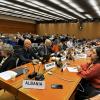News
Displaying Results 1 - 25 of 82
Extreme weather events exacerbated by climate change increasingly threaten the ability of countries worldwide, including those in the UNECE region, to sustain safe, reliable, and equitable transport and mobility.
Adapting to future impacts of climate change is therefore no longer a concern to be…
In the face of global crises, progressing towards Sustainable Development Goal (SDG) 16—promoting peaceful, inclusive societies, justice for all, and accountable institutions—is a cross-cutting enabler for the 2030 Agenda. SDG16 intertwines with the other SDGs, underscoring the importance of…
The impact of different air pollutants on vegetation and crops has been studied for over 35 years in the framework of the UNECE Convention on Long-range Transboundary Air Pollution, through its International Cooperative Programme on Effects of Air Pollution on Natural Vegetation and Crops (ICP…
The transport sector is responsible for 23% of global greenhouse gas emissions, with road transport accounting for around 77% of these emissions. As populations, economies, and the need for mobility grow, the World Bank estimates that greenhouse gas (GHG) emissions from transport could increase by…
Ensuring the principles of environmental democracy are upheld in relation to modified organisms/genetically modified organisms (LMOs/GMOs) can help countries to address biodiversity loss and support progress on a number of Sustainable Development Goals, in particular Goals 2 (zero hunger), 15 (life…
Cooperation and management of transboundary waters, which span over 45% of the world's surface and serve as vital resources for nearly half of the global population, face the imminent threat of underfunding. The last reporting exercise on Sustainable Development Goals (SDG) indicator 6.5.2 (2020),…
The Protocol on Pollutant Release and Transfer Registers (Protocol on PRTRs) sets international standards for reporting on pollutant releases from a range of economic activities, such as mineral industry operations, plastic production, waste and wastewater management or the rearing of poultry or…
Transparency in the environmental performance of economic activities and effective public access to environmental information, especially on products, are indispensable in addressing pressing environmental challenges. This also supports a just transition towards a green and circular economy,…
The Mediterranean Region, home to over 510 million people, is an important crossroads for economic, social and cultural exchanges between Europe, Africa, Asia and other continents. The region is rich in biodiversity, but has come under pressure due to the intensive exploitation of mineral resources…
In the UNECE region, the Fourth Cycle of Environmental Performance Reviews (EPR) kicks off with the review of Tajikistan, carried out for the fourth time under the leadership of UNECE.
A large, multidisciplinary team of international experts worked in Dushanbe from 6 to 15 November 2023,…
The European Commission has proposed a new legislation, the European Critical Raw Materials Act, to ensure a secure and sustainable supply of critical raw materials for the EU. The Act, on which the European Parliament and the European Council reached a provisional agreement on 13 November,…
The Asia-Pacific region is home to some of the world's largest and most diverse reserves of minerals, energy, water, and biomass. The region accounts for around 70% of global mining production and consumption, including most of the world's bauxite, copper, iron, nickel, silver, tin, and zinc. …
The ongoing repercussions of the COVID-19 pandemic, geopolitical instability, and elevated inflation rates continue to pose challenges to global trade, with the World Trade Organization (WTO)'s trade growth forecast now estimated at only 0.8% this year.
As the global trade landscape grapples…
The Republic of Moldova is almost entirely dependent on energy imports as it has no domestic sources of fossil fuels and makes only limited use of its renewable energy potential. At the same time, the energy intensity in the country is 3.4 times higher than the average energy intensity in the…
Taking up some of the main results of the recent review report, which assessed the effectiveness of the amended Protocol to Abate Acidification, Eutrophication and Ground-Level Ozone (Gothenburg Protocol) under the UNECE Convention on Long-range Transboundary Air Pollution, experts discussed…
In today's data-driven world, organizations face the challenge of efficiently integrating and making sense of vast amounts of diverse data. Semantics and semantic interoperability provide a solution by enabling the meaningful interpretation and integration of data across heterogeneous systems. To…
The public and civil society have a crucial role to play in tackling key environmental challenges. To make the most of this potential, continued efforts are needed to uphold their rights to shape environmental decision-making.
To this end, the Working Group of the Parties to the Convention on…
The Norwegian Government has issued a Mineral Strategy which necessitates the Geological Survey of Norway to produce an inventory aligned with the United Nations Framework Classification for Resources (UNFC).
UNFC will be crucial in this strategy as it will be used to classify mineral resources…
While underground coal mining in Albania stopped almost wholly (except for two private mines with a very insignificant output) more than 15 years ago, the abandonment of the mines from the 1990s onwards with no proper plans for closure has left a legacy of risks. These include water contamination,…
For some time now, Uzbekistan has been engaged in various activities under the UNECE Convention on Access to Information, Public Participation in Decision-making and Access to Justice in Environmental Matters (Aarhus Convention).
An international round table entitled “Aarhus Convention: Effective…
For many people around the world, the work and achievements of the United Nations remain in the realms of grand summits of heads of state on pressing global issues, of diplomatic brokering of peace agreements, of urgent humanitarian interventions for people in the greatest need, and other high-…
Over two-thirds of Togo’s water resources are shared, notably through the Mono River basin (shared with Benin) and Volta River basin (shared with Benin, Burkina Faso, Côte d’Ivoire, Ghana and Mali), as well as aquifers in the coastal sedimentary basin (shared with Ghana, Benin and Nigeria).
In a…
To address the conclusions of the review of the amended Protocol to Abate Acidification, Eutrophication and Ground-Level Ozone (Gothenburg Protocol), as adopted by the Executive Body to the UNECE Convention on Long-range Transboundary Air Pollution in December 2022, further work is currently being…
Representatives from Kazakhstan, Kyrgyzstan, Tajikistan, and Uzbekistan met at the United Nations Economic Commission for Europe (UNECE) to discuss ways to unlock the resource potential and promote a sustainable future in Central Asia. The meeting was part of the UNECE Resource Management Week 2023…
How can regional and international cooperation be fostered in a region that faces unprecedented water scarcity? How can the benefits of this vital resource be shared to increase resilience to climate change?
The Third Baghdad International Water Conference titled "Water Scarcity, the Mesopotamian…

























